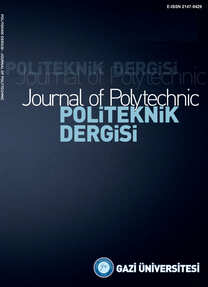Ticari Gemiler İçin Seyir Süresi ve Yakıt Tüketiminin Azaltılması Amaçlı, Hava ve Deniz Şartlarına Göre Rota Optimizasyonu Sistemi (Ege Denizi Örneği)
: CSGA, Rota Optimizasyonu, Ege Denizi, Inmarsat, Copernicus
Weather Routing Optimization System for the Purpose of Reducing Fuel Consumption and Navigation Time of Merchant Ships (Aegean Sea Model)
CSGA, weather routing, aegean sea, inmarsat, copernicus,
___
- [1] İnan T., “Yüzen vasıtalar için seyir planlaması yapabilen bir zeki sistemin geliştirilmesi”, Doktora Tezi, Marmara Üniversitesi Fen Bilimleri Enstitüsü, (2019).
- [2] James R., “Application of wave forecasts to marine navigation”, 1, U.S. Naval Oceanographic Office, Washington, (1957).
- [3] Hagiwara H., Spaans J.A.,”Practical weather routing of sail-assisted motor vessels”, Journal of Navigation, 1:96-119, (1987).
- [4] Lo H., McCord M.R., “Adaptive ship routing through stochastic ocean currents: general formulations and empirical results”, Transportation Research Part A: Policy and Practice, 32:547-561, (1998).
- [5] Pacheco M.B., Soares C.G., “Ship weather routing based on seakeeping performance, International Conference on Marine Structures, Glasgow,71-78 (2007).
- [6] Padhy C., Sen D., Bhaskaran P.K., “Application of wave model for weather routing of ships in the north ındian”, Natural Hazards, 44:373-385, (2007).
- [7] Szlapczynska J., Smierzchalski R., “Multicriteria optimisation in weather routing”, TransNav, 3:393-400, (2009).
- [8] Jörn H. Ve Günther C., “Robust pareto-optimum routing of ships utilising deterministic and ensemble weather forecasts”, Ships and Offshore Structures, 5:105-114, (2010) .
- [9] Delitala A.M.S., Gallino S.,Villa L., Lagouvardos K. Ve Drago A.,”Weather routing in long distance mediterranean routes”, Theoretical and Applied Climatology, 102:125-137, (2010).
- [10] Maki A., Akimoto Y., Nagata Y., Kobayashi S., “A new weather-routing system that accounts for ship stability based on a real-coded genetic algorithm”, Journal of Marine Science and Technology , 16: 311-322, (2011).
- [11] Kosmas O. ve Vlachos D., “Simulated annealing for optimal ship routing” ,Computers & Operations Research, 39:576-581, (2012).
- [12] Shao W., Zhou P. ve Thong S. K., “Development of a novel forward dynamic programming method for weather routing,”, Journal of Marine Science and Technology, 17: 239-251, (2012).
- [13] Mannarini G., Coppini G., Oddo P. ve Pinardi N., “A prototype of ship routing decision support system for an operational oceanographic service”, TransNav, 7:53-59, (2013).
- [14] Fang M. C. ve Lin Y.H., “The optimization of ship weather-routing algorithm based on the composite ınfluence of multi-dynamic elements (II): optimized routings”, Applied Ocean Research, 50: 130-140, (2015).
- [15] Tsou M.C. ve Cheng H.C., “An ant colony algorithm for efficient ship routing”, Polish Maritime Research, 20:28-38, (2013).
- [16] Cai Y. ve Yuanqiao W., “Ship route design for avoiding heavy weather and sea conditions”, TransNav, 8:551-556, (2014).
- [17] Kepaptsoglou K., Fountas G. ve Karlaftis M., “Weather ımpact on containership routing in closed seas: a chance-constraint optimization approach”, Transportation Research Part C: Emerging Technologies, 55:139-155, (2015).
- [18] Kobayashi E., Hashimoto H., Taniguchi Y. ve Yoneda S., “Advanced optimized weather routing for an ocean-going vessel”, International Association of Institutes of Navigation World Congress (IAIN), Prague, (2015).
- [19] Zhu X., Wang H., Shen Z. ve Hongjun L., “Ship weather routing based on modified dijkstra algorithm”, 6th International Conference on Machinery, Materials, Environment, Biotechnology and Computer, Tianjin, 696-699, (2016).
- [20] Vettor R. ve Soares C., “Development of a ship weather routing system”, Ocean Engineering, 123:1-14, (2016).
- [21] Lee H., Aydin N., Choi Y. Lekhavat S. ve Irani Z., “A decision support system for vessel speed decision in maritime logistics using weather archive big data”, Computers & Operations Research, 98:330-342, (2018).
- [22] Veneti A., Makrygiorgos A., Konstantopoulos C., Pantziou G. ve Vetsikas I. A., “Minimizing the fuel consumption and the risk in maritime transportation: a bi-objective weather routing approach”, Computers and Operations Research, 88:220-236, (2017).
- [23] Xiaogang L., Hongbo W. ve Wu Q., “Multi-objective Optimization in ship weather routing”, Constructive Nonsmooth Analysis and Related Topics , Saint Petersburg, 1-4, (2017).
- [24] Hong-Bo W., Li X.G., Li P.F. ve Veremey E. I., “Application of real-coded genetic algorithm in ship weather routing”, Journal of Navigation, 71:989-1010, (2018).
- [25] Tanaka M. ve Kobayashi K., “A route generation algorithm for an optimal fuel routing problem between two single ports”, International Transactions in Operational Research, 26:529-550, (2019).
- [26] Feng L. “Study on the ship's loss-speed in wind and waves”. Journal of Dalian Maritime University, 18:347–351,(1992).
- [27] Lin Y.H. ve Fang M.C., “The ship-routing optimization based on the three-dimensional modified isochrone method”, International Conference on Ocean, Offshore and Arctic Engineering , Nantes, France, 1-4, (2013).
- [28] MAN, Technical Specifications of MAN Engines. Erişim Tarihi:02/02/2018. Url: https://marine.man-es.com/.
- [29] Lin Y.H., Fang M.C. ve Yeung R. W., “The optimization of ship weather-routing algorithm based on the composite influence of multi-dynamic elements”, Applied Ocean Research, 184-194, (2013).
- ISSN: 1302-0900
- Yayın Aralığı: 6
- Başlangıç: 1998
- Yayıncı: GAZİ ÜNİVERSİTESİ
NACA 0009 Profilli Bir Kanadin Düşük Bir Reynolds Sayisinda Had Analizi
Yasin Furkan GÖRGÜLÜ, M. Arif ÖZGÜR, RAMAZAN KÖSE
Düşük Hidrojen Gaz Konsantrasyonunda Tungsten katkılı ZnO İnce filmlerin Gaz Sensörü Uygulamaları
Sol-Jel Yöntemiyle IGZO Partiküllerin Üretimi, Peletlenmesi ve Karakterizasyonu
Hibrit (GFRP-Çelik) Donatılı Kirişlerde Donatı Oranının Eğilme Davranışına Etkileri
Nalan KAYA, Eda AVANOĞLU, Şule ER, Yağmur KOPRAMAN, Alper BÜYÜKKARAGÖZ
Kömür Yakıtlı Termik Santralin Çalışma Esnekliğinin İncelenmesi
Determination of Energy Spectra By Using Proper Quantization Rule of Woods-Saxon Potential
Rezvan REZAEIZADEH, Niloufer ZOGHI FOUMANI, Abbas GHASEMIZAD, Aybaba HANÇERLİOĞULLARI
Bilal CANÖZ, Ayşegül Ülkü METİN, Metin GÜRÜ
